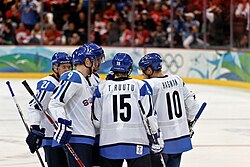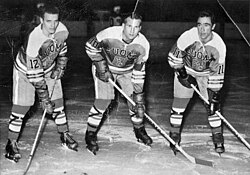History
Finland's first appearance in an elite ice hockey competition was at the 1939 Ice Hockey World Championships in Switzerland. The result was a shared last place with Yugoslavia. Ten years later, Finland came to the 1949 Ice Hockey World Championships in Sweden. The Finns finished in 7th place by winning the consolation round. Finland's first appearance at the Winter Olympics occurred in 1952 in Oslo.
In the 1974 Men's World Ice Hockey Championships two players were suspended for doping. They were the Swede Ulf Nilsson and the Finn Stig Wetzell who failed a drug test for the forbidden substance ephedrine. Both players were suspended for the rest of the tournament. Nilsson failed the test after Sweden's game against Poland, which Sweden won 4–1. The game was awarded to Poland as a 5–0 forfeit. The Finn, Wetzell, failed the test after Finland's match against Czechoslovakia, which Finland won 5–2, meaning the game was awarded to Czechoslovakia as a 5–0 forfeit. The Finns were able to defeat Czechoslovakia again on the last day, which would have earned their first medal in history, if not for the points lost in the forfeited win.
Finnish National Team played one regular season game in the World Hockey Association (WHA) against the Edmonton Oilers in 1978–79 season.
Finland was close again to winning the first medal in its history at the 1986 Men's World Ice Hockey Championships, when it led 4–2 in the final minute of the medal round match against Sweden. However, in the last minute of the match Anders "Masken" Carlsson first narrowed Finland's lead to one goal and then leveled the score with the help of the Finns' mistake. The match eventually ended in a 4–4 draw, meaning Finland's ranking in the tournament was fourth place.
At the 1992 Men's Ice Hockey World Championships, Finland's success and silver medal came as a surprise to many Finns, as the team was not expected to much because of inexperience and the lack of success at the 1992 Albertville Winter Olympics in the same year. The medal achieved in the tournament was the first World Championship medal and the second value medal after the 1988 Calgary Winter Olympics, where Finland clinched a surprise silver after defeating the unmotivated USSR.
At the 1995 Men's World Ice Hockey Championships, Finland achieved its first gold in international ice hockey. The Finns reached the final with a 5–0 victory over France in the quarter-finals, and a 3–0 victory over the Czech Republic in the semi-finals. In the final, Finland faced off against their hockey rivals and host of the 1995 tournament, Sweden. In the first period of the final, left wing Ville Peltonen scored a natural hat-trick, and then assisted Timo Jutila's first period goal to give Finland a 4–0 lead, on the way to an eventual 4–1 victory.
At the 1998 Olympic men's ice hockey tournament, Team Finland came away with bronze, after defeating the Canadian national team 3–2. Teemu Selänne led the tournament in goals scored (4) and total points achieved (10). The tournament was the first in which players from the National Hockey League (NHL) were released to participate, allowing national teams to be constructed using the best possible talent from each country. The 1998 Olympic tournament therefore came to be known as the Tournament of the Century.
At the 2006 Winter Olympics, Finland won a silver medal, coming close to winning in the final but losing 3–2 to Sweden. Finland's goaltender Antero Niittymäki was named the MVP of the tournament (with only eight goals conceded throughout the whole tournament) and Teemu Selänne was voted best forward. The format was changed from the 1998 and 2002 tournaments, to a format similar to the 1992 and 1994 tournaments. The number of teams was reduced from 14 to 12. The 12 teams were split into two groups in the preliminary stage, which followed a round robin format. Each team played the other teams in their group once. The top four teams from each group advanced to the quarter-finals.
At the 2006 IIHF World Championship, Finland achieved third place after winning the bronze medal game against Canada. Petteri Nummelin was named to the Media All-Star Team.
At the 2007 IIHF World Championship, Finland lost the final to the Canadian team. The final marked the second time that Finland and Canada met in the gold medal game of a World Championship, the first time being in 1994. Only a year before, in 2006 Finland had defeated Canada 5–0 in the bronze medal game. In 2007, Canada were looking on form, being undefeated coming into the playoff round, while Finland had registered two losses in the run-up to the finals. Rick Nash scored on the powerplay at 6:10 into the first period on a one-timer from the point from a pass by Cory Murphy off of Matthew Lombardi, to put Canada up 1–0. Near the middle of the period, Eric Staal scored in similar fashion also on the powerplay, assisted by Justin Williams, and Mike Cammalleri. 9:11 into the second period, Colby Armstrong scored to give the Canadians a 3–0 lead. This goal ended up as the game winner. Finland had some discipline difficulty in the first two periods, taking 6 minutes apiece in penalties in both periods. The Finns started to bring up the pressure in the last ten minutes, and Petri Kontiola scored a nice glove-side goal on Ward at 51:08 assisted by Ville Peltonen, to put the team on the board. With only 3 minutes left Antti Miettinen scored to bring Finland within one, 3–2. However, just one minute later Rick Nash scored on a skillful breakaway to put the game away, with Canada winning 4–2 and clinching the title. The Canadians were outshot 22–18, but their goaltender, Cam Ward, kept Canada in the game as he was solid between the pipes. They also were able to capitalize on the powerplay, which ended up being decisive in the Canadian win. Kari Lehtonen was voted Tournament's best goaltender.
At the 2008 IIHF World Championship, Finland achieved third place after winning the bronze medal game 4–0 against rivals Sweden.
At the 2010 Winter Olympics, Finland again came away with the bronze, winning 5–3 against Slovakia. During the tournament, Teemu Selänne became the all-time leader for points scored in the Olympics. [2] [3] He notched an assist in his second game of the tournament for 37 career points, surpassing Valeri Kharlamov of the Soviet Union, Vlastimil Bubník of Czechoslovakia, and Harry Watson of Canada. [2] [3]
At the 2011 IIHF World Championship, Finland won its second world title, beating the Swedish national team by a score of 6–1 in the final. As two highly ranked neighboring countries, Sweden and Finland have a long-running competitive tradition in ice hockey. Before the game, mainstream media in both countries titled the match "a dream final". [4] [5] After a goalless first period, Sweden opened the game with a 1–0 goal by Magnus Pääjärvi in the second period at 27:40. Seven seconds before the period's end, Finland's Jarkko Immonen scored to tie the game 1–1. Finland took the lead early in the third period, scoring two goals at 42:35 and 43:21 by Nokelainen and Kapanen. Sweden then took a time-out with ten minutes left to play but did not manage to regroup, and Finland scored a further three goals courtesy of Janne Pesonen, Mika Pyörälä and Antti Pihlström to clinch the title. [6] Team Finland's Jarkko Immonen led the tournament in both goals and points scored, with 9 and 12 respectively.
The Finns won their third world title at the 2019 IIHF World Championship in Slovakia, and after the cancelled tournament of 2020, they reached the final in the 2021 tournament, losing to Canada in overtime.
At the 2022 Winter Olympics, Finland won the gold medal for the first time, going undefeated and beating Russia in the final. [7] [8] [9] This allowed them to rise to first place in the IIHF World Ranking for the first time ever. In May 2022, Finland won their fourth World Championship, beating Canada in overtime after a hard-fought game. This was the third Canada–Finland final in a row, and the first time the Finns won a medal on home ice. [10]
























